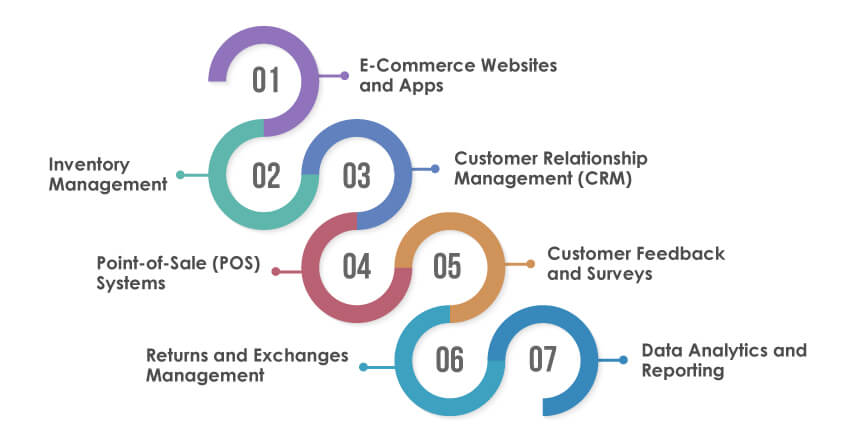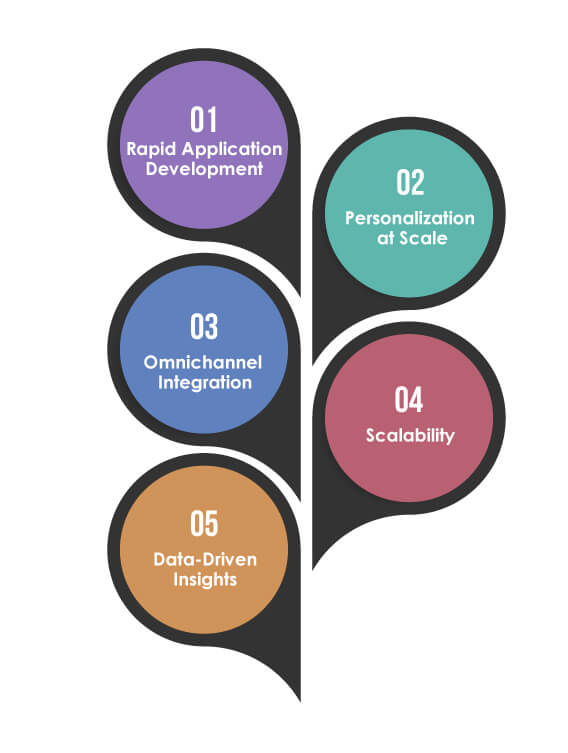Recommended Blogs
How Low-Code Platforms in Retail are Transforming the Industry?

- Importance of Low-Code Platforms in Retail
- Quick Path with Low-Code for Retailers
- Use Cases for Low-Code Platforms in Retail Industry
- Benefits of Using Low-Code Platforms in Retail Industry
- Trends Driving the Adoption of LCNC in Retail Industry
- Conclusion
- How TestingXperts Can Help You with Low-Code Platforms in Retail?
In the recent past, businesses were depended solely on IT experts to create the necessary scripts for maintaining seamless operations. Nonetheless, challenges emerged, especially as the scarcity of skilled personnel expanded. This resulted in numerous organizations facing disruptions or glitches in their processes due to a deficiency in specialized knowledge and sufficient resources.
When it comes to embarking on your retail journey, it involves a multitude of tasks, from product selection or creation to building a workforce. However, once your store is operational, a crucial element comes into play: retail marketing. This is the phase where you harness strategies to promote your business.
The advent of low-code/no-code automation effectively addresses these challenges, dismantling obstacles and granting teams of varying expertise the capability to effortlessly oversee IT operations.
What is Low Code/No Code?
Put in the most basic terms, low-code or no-code automation platforms are software tools that demand minimal to zero coding expertise. Unlike traditional backend programming from earlier times, low-code/no-code automation adopts a more visual approach. It provides pre-designed workflow templates and a user-friendly drag-and-drop interface, allowing users to customize workflows easily.
Importance of Low-Code Platforms in Retail
With numerous benefits of Low-code Development, the low-code market is expected to cross $148 billion by 2030.
Low-code technology has emerged as a pivotal asset for the retail sector, offering a streamlined approach to application development and innovation. In an industry marked by fast-paced shifts in consumer behavior and market trends, low-code technology provides retailers with the agility to respond swiftly to changing demands.
Its user-friendly visual interfaces and pre-designed templates enable even non-technical teams to contribute to the creation of customized solutions, ranging from customer-facing applications to backend systems. By accelerating the development cycle and reducing the reliance on complex coding, low-code technology empowers retailers to enhance customer experiences, optimize operations, and remain competitive in an ever-evolving digital landscape.
Quick Path with Low-Code for Retailers
According to Gartner’s analysis, a projection indicates that by 2024, approximately 65% of all applications will be generated through the utilization of low-code platforms. While low-code technology is already present, its transformative journey is merely in its initial stages.
Retail enterprises have displayed a heightened drive to harness the potential of low-code technology, seeking to secure competitive edges through swift responsiveness to emerging market prospects. A prime illustration lies in the case of Pampered Chef, a kitchenware company under Berkshire Hathaway’s umbrella.
They embraced low-code to expedite the creation of novel digital application prototypes, effectively transitioning them into live experiment scenarios involving real customers. Shiv Dutt, Pampered Chef’s VP of Digital Experience and Innovation, elucidated, “We achieved the rapid construction, testing, and refinement of a digital solution that facilitates virtual parties, perfectly aligning with our distinct business model.”
Prominent retailers such as ULTA Beauty and Jockey have also emerged as pioneers in embracing low-code technology. They have utilized low-code to create mobile apps and swiftly incorporate new functionalities that resonate with the evolving demands within their respective markets. As the inclination towards low-code development experiences a steady surge in popularity, the prevalence of low-code platforms has grown in tandem to address this demand. The diagram below illustrates the ongoing expansion of patents associated with emerging low-code platforms.
Use Cases for the Low-Code Platforms in Retail Industry

Low-code platforms offer versatile solutions for the retail industry, addressing a range of challenges and enabling innovative approaches to various processes. Here are some prominent use cases of low-code platforms in the retail sector:
E-Commerce Websites and Apps:
Retailers can quickly develop and update e-commerce platforms, including websites and mobile apps, using low-code platforms. This enables them to create engaging online shopping experiences, streamline checkout processes, and incorporate personalized product recommendations.
Inventory Management:
Low-code platforms can be employed to design inventory management systems that optimize stock levels, manage replenishment, and facilitate efficient supply chain operations. Real-time tracking and alerts ensure timely stock replenishment and reduce overstocking or stockouts.
Customer Relationship Management (CRM):
Retailers can utilize low-code platforms to build CRM systems that consolidate customer data, preferences, and purchase history. This enhances customer engagement, allowing personalized interactions and targeted marketing campaigns.
Point-of-Sale (POS) Systems:
Low-code platforms enable the creation of modern and user-friendly POS systems that streamline checkout processes, accept multiple payment methods, and integrate seamlessly with inventory management.
Customer Feedback and Surveys:
Low-code platforms can help retailers build feedback and survey tools to gather customer insights. This data aids in refining products, services, and customer experiences.
Returns and Exchanges Management:
Retailers can streamline the returns and exchanges process by creating applications that automate returns authorization, generate return labels, and update inventory accordingly.
Data Analytics and Reporting:
Retailers can build analytics dashboards to track sales performance, inventory turnover, and customer behavior, allowing for data-driven decision-making.
In essence, low-code platforms empower retailers to address a wide array of challenges and opportunities across different aspects of their operations, from customer engagement to supply chain management and beyond.
Benefits of Using Low-Code Platforms in Retail Industry

Using low-code platforms offers numerous benefits to the retail industry, revolutionizing how businesses operate, innovate, and engage with customers. Here are the key advantages:
Rapid Application Development:
Low-Code Platforms empower retailers to develop and deploy customer-centric applications and digital solutions at unprecedented speeds. Whether it’s a mobile app, an e-commerce platform, or a personalized loyalty program, these platforms significantly reduce development time, ensuring that innovative features and improvements reach customers quickly.
Personalization at Scale:
Customer personalization is no longer a luxury; it’s an expectation. Low-Code Platforms enable retailers to create personalized shopping experiences by quickly building and deploying tailored applications. These platforms can integrate with customer data sources, analyze behavior, and provide personalized recommendations and content in real-time, resulting in higher engagement and conversion rates.
Omnichannel Integration:
Customers today interact with retailers through various channels—brick-and-mortar stores, websites, mobile apps, social media, and more. Low-Code Platforms facilitate the development of applications that seamlessly integrate these channels. For example, a customer can start shopping online, visit a physical store, and continue the transaction seamlessly using a mobile app.
Scalability:
As retail businesses grow, they need to scale their digital infrastructure to accommodate more customers and transactions. Low-Code Platforms make it easy to scale applications and services without the need for extensive coding or redevelopment, ensuring a smooth and uninterrupted customer experience.
Data-Driven Insights:
Low-Code Platforms often come equipped with analytics and reporting tools. Retailers can use these tools to gain valuable insights into customer behavior, preferences, and trends. By leveraging data-driven decision-making, retailers can continually optimize the customer experience.
Low-code platforms provide the retail industry with the tools to innovate, streamline operations, enhance customer experiences, and adapt swiftly to changing market dynamics, ultimately contributing to sustained growth and success.
Trends Driving the Adoption of LCNC in Retail Industry

The retail industry is undergoing a significant transformation driven by various trends that are accelerating the adoption of Low-Code/No-Code (LCNC) solutions. Firstly, the demand for rapid digitalization is paramount, and LCNC platforms empower retailers to create custom applications and digital experiences without the need for extensive coding, allowing them to keep pace with the evolving consumer landscape.
Digital Transformation Demands:
The retail industry is undergoing a rapid digital transformation to meet the evolving needs and preferences of consumers. LCNC platforms enable retailers to develop and deploy digital solutions quickly, keeping them competitive in the fast-paced digital landscape.
Personalization Emphasis:
Consumers now expect highly personalized shopping experiences. LCNC allows retailers to build custom applications and tools tailored to individual customer preferences, enhancing customer satisfaction and loyalty.
Agile Development Needs:
The ability to adapt and respond swiftly to market changes and consumer demands is crucial. LCNC facilitates agile development, enabling retailers to iterate and deploy new features and applications rapidly.
Competitive Advantage:
Retailers leveraging LCNC gain a competitive edge by staying ahead of the curve in terms of innovation and technology adoption, meeting the heightened expectations of today’s tech-savvy consumers.
Accessibility and Inclusivity:
LCNC platforms empower individuals with varying levels of technical expertise to participate in the development process. This inclusivity fosters innovation and creativity within retail teams.
Conclusion
In conclusion, the integration of low-code platforms into the retail industry has ushered in a transformative era, offering a plethora of advantages that resonate across the entire business landscape. The ability to rapidly develop applications, enhance customer experiences, and adapt to evolving market dynamics has become a game-changer for retailers. As market demands and consumer preferences continue to evolve at an unprecedented pace, low-code platforms provide the agility required to stay ahead.
From streamlining inventory management and optimizing supply chains to fostering innovation and collaboration among cross-functional teams, these platforms have become the catalysts for innovation and growth within the retail sector. The seamless synergy of technology and business objectives, coupled with the potential to create personalized, user-friendly experiences, positions low-code platforms as not just tools, but strategic assets that propel retailers towards sustained success in an ever-evolving industry. As retail continues to evolve, the role of low-code platforms will undoubtedly remain pivotal, enabling retailers to not only keep pace but also lead the way in a digitally driven future.
How TestingXperts can help you with Low-Code Platforms in Retail?
TestingXperts is your trusted partner in harnessing the potential of low-code platforms within the retail domain. With our deep expertise in software testing and quality assurance, we offer tailored solutions that align with the unique needs of the retail industry. Our comprehensive testing services cover every facet of low-code applications, ensuring they meet the highest standards of functionality, performance, security, and user experience.
From validating seamless user interactions and cross-device compatibility to fortifying data protection and optimizing application performance, TestingXperts ensures your low-code solutions are thoroughly tested and refined. With our assistance, you can confidently deploy applications that offer a seamless shopping experience, maximize operational efficiency, and drive customer satisfaction in the competitive retail landscape.
Discover more
